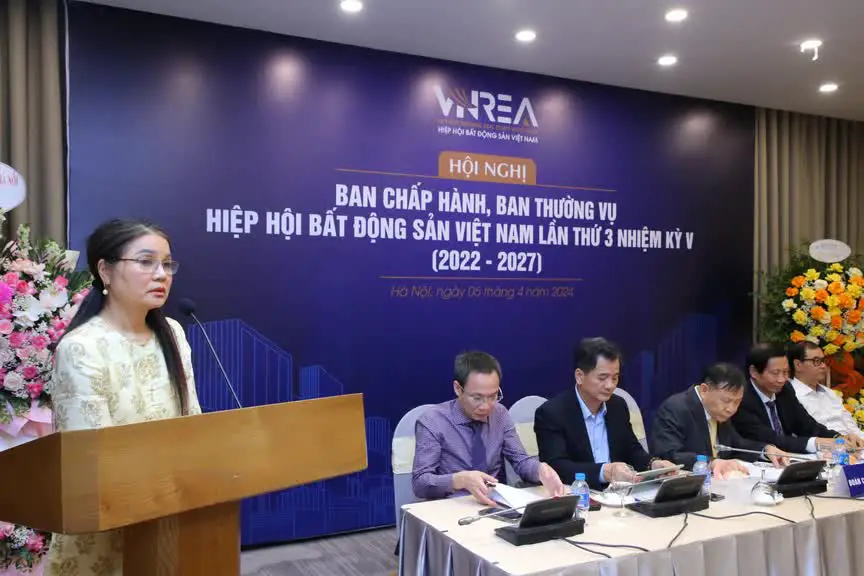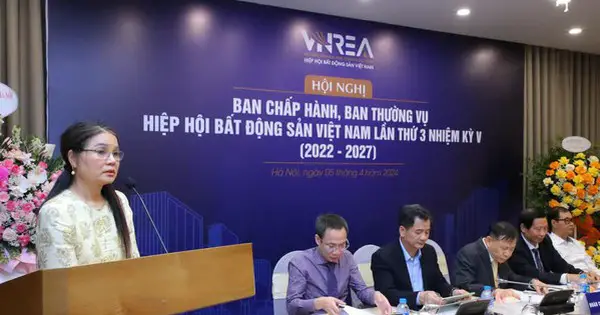Renovating Old Apartments is Even Harder Than Building Social Housing

At the annual event “Executive Committee, Standing Committee Meeting and Member Gathering 2024” organized by the Vietnam Real Estate Association (VNREA) on April 5, Ms. Tô Thị Hạnh, Member of the VNREA Standing Committee, shared her insights on major obstacles in the renovation of old apartments.
According to Hạnh, over the past 20 years, the progress of renovating old apartments nationwide has been very slow compared to the set plan, reaching only 1-2%. This rate is too low, especially in major cities like Hanoi and Ho Chi Minh City, where many difficulties arise.
The initial draft of the Housing Law included a chapter on renovating old apartments, but it was very rudimentary. If things continue this way, we will still be at a standstill in 10-20 years, Hạnh remarked.
Some believe that renovating old apartments is the benefit of private ownership related to businesses. Hạnh countered that renovating old apartments is even more challenging than developing social housing because it involves the interests of residents living in these old apartments, so a reasonable mechanism is needed.
The residents always expect a high compensation ratio before agreeing to relocation, while businesses need a mechanism to recover capital and maintain balanced benefits. However, due to planning constraints, businesses are unable to freely construct or accept new residents after the renovation project.
As a result, businesses lack the necessary capital for renovation. These major obstacles prevent businesses from balancing capital recovery, while the state has not yet played a predominant role in regulating these issues, emphasized Hạnh.
Another point of concern is the role of the state in renovating old apartments. Government Decree 34 also mentioned the role of the state in renovating old apartments. However, Government Decrees 69 and 101 issued by the Ministry of Construction, as well as the current regulations of the Housing Law, do not specify the role of the state. Renovating old apartments is a special type of housing, so the roles of the state, businesses, and residents need to be clearly defined in the law for a harmonious relationship.
“Renovating old apartments is similar to implementing a special type of social housing, requiring a balance of interests among the parties involved, with a leading role and supervision by the state to create favorable mechanisms to support businesses and residents. However, the recently enacted Housing Law, as well as Government Decrees 69 and 101, do not provide clear regulations. This means that businesses and residents will negotiate with each other, but the interests of these two parties will never align and will always run parallel. In this way, renovating old apartments will never be implemented,” expressed Hạnh.
Currently, Hạnh’s company is actively participating with the VNREA in providing suggestions for the implementation decree of the Housing Law. The company is also making many specific recommendations related to real-world practice. Additionally, they intend to collaborate extensively with the Ministry of Construction to renovate old apartments, Hạnh added.
According to the Ministry of Construction’s preliminary statistics, there are over 2,500 old apartment buildings (equivalent to over 3 million square meters) built before 1994, with more than 100,000 households living in them. Among them, Hanoi has about 1,579 buildings, while Ho Chi Minh City has nearly 500 buildings. The main reasons for the stagnation of renovating and constructing old apartments, especially deteriorating collective housing, are obstacles related to mechanisms, financial plans, and compensation.
In addition, difficulties and obstacles arise in investment procedures, land recovery, land allocation, compensation, support, and resettlement due to the overlapping and non-cohesive application of housing, land, and investment laws.
Furthermore, renovating apartment buildings presents challenges as certain decisions require the majority or consent of all residents before implementation. Meanwhile, providing incentives for investors to renovate and rebuild old apartments also faces difficulties, resulting in some unappealing projects for participating investors.

